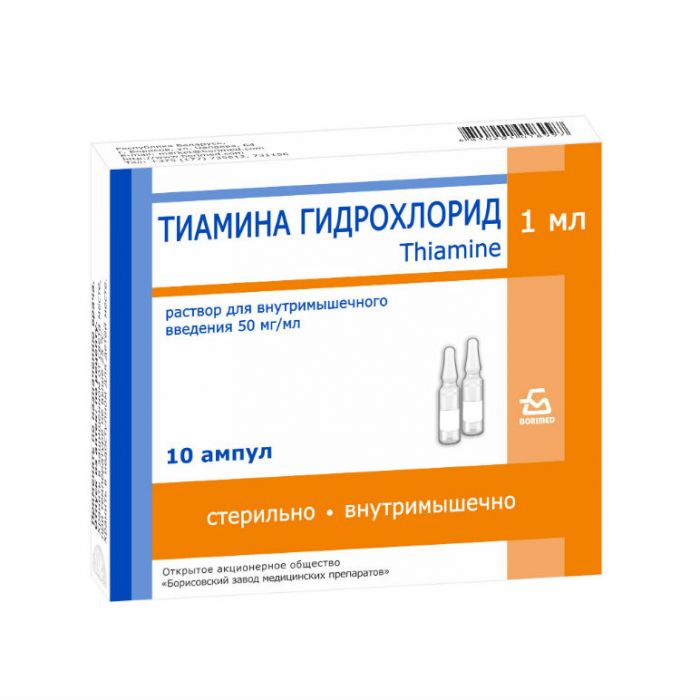thiamin | Thiamine ampoules 5%, 1 ml, 10 pcs.
Special Price
$13.72
Regular Price
$21.00
In stock
SKU
BID472408
Release form
Injection.
Packing
10 ampoules of 1 ml.
Indications
Hypovitaminosis and vitamin B1 vitamin deficiency. Treatment of conditions associated with vitamin B1 deficiency: - developing against the background of diabetes mellitus, alcoholism, treatment with antibiotics and chemotherapeutic agents that suppress the intestinal flora, synthesizing B vitamins with prolonged administration of hypertonic glucose solutions in patients with renal pathology, undergoing hemodialysis, etc.
- beriberi disease, pathology of the central (Wernicke encephalopathy) and peripheral nervous system (mono-and polyneuropathy, neuralgia, including shingles, myalgia)
- pathology of the cardiovascular system
- malabsorption syndrome of various origin, location on probe feed.
Dosage form “solution for injection” is used in all clinical situations when it is necessary to quickly eliminate vitamin B1 deficiency and the inability to ingest.
Contraindications
Hypersensitivity.
Special instructions
Parenteral administration is recommended only if oral administration is not possible (nausea, vomiting, malabsorption syndrome, preoperative or postoperative conditions). With Wernicke encephalopathy, the appointment of dextrose should precede the intake of thiamine.
Dosage and administration of
Intramuscularly (deeply).
Adults are prescribed 25-50 mg of thiamine hydrochloride (0.5-1.0 ml) once a day, daily. The introduction begins with small doses - not more than 0.5 ml (25 mg) of the drug. With good tolerance, the dose is increased by 25 mg / day. The maximum daily dose is 300 mg / day. The course of treatment is 10 to 30 injections.
Children: thiamine hydrochloride is prescribed at 12.5 - 25 mg once a day. Due to the complexity of dosing, instead of a solution of thiamine hydrochloride 50 mg / ml, it is recommended to use a solution of thiamine hydrochloride 25 mg / ml for the treatment of patients of this age category.
Side effects
Allergic reactions (urticaria, skin itching, Quincke's edema, rarely - anaphylactic shock), sweating, tachycardia. Seldom soreness (due to the low pH of the solutions).
Drug Interactions
Thiamine chloride solution should not be mixed with sulfite-containing solutions, as in them it completely breaks up. The simultaneous parenteral administration of thiamine with pyridoxine or cyanocobalamin is not recommended: pyridoxine complicates the conversion of thiamine into a biologically active form, cyanocobalamin enhances the allergenic effect of thiamine. Thiamine and penicillin or streptomycin (destruction of antibiotics), thiamine and nicotinic acid (destruction of thiamine) should not be mixed in one syringe. It weakens the effect of depolarizing muscle relaxants (suxamethonium iodide, etc.).
Overdose
Overdose may increase the symptoms of side effects of the drug. When used at high doses for a long time, signs of hyperthyroidism may appear: headache, excitation, tremor, increase in heart rate, insomnia.
Treatment: discontinue treatment - symptomatic.
Storage conditions
Store in a dry place at a temperature not exceeding 25 РC, out of the reach of children.
Shelf life
3 years.
Terms and conditions
prescription
Dosage form
injection for injection
Indications
Indications
From hypovitaminosis, From psoriasis, From alcoholism, From neuritis, Eczema, From radiculitis, From angina pectoris, With malnutrition, Neurodermatitis
Borisov factory, Belarus
Write Your Own Review

